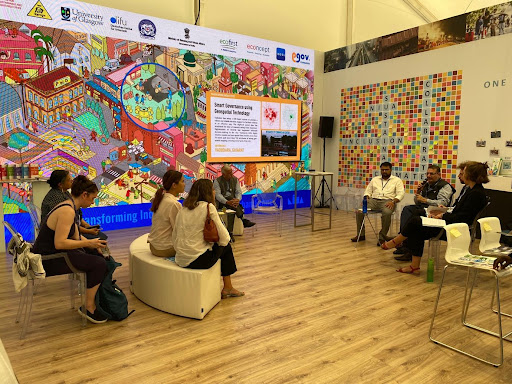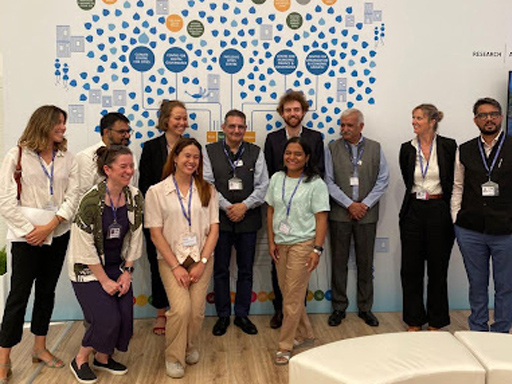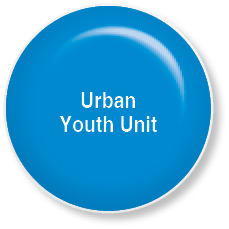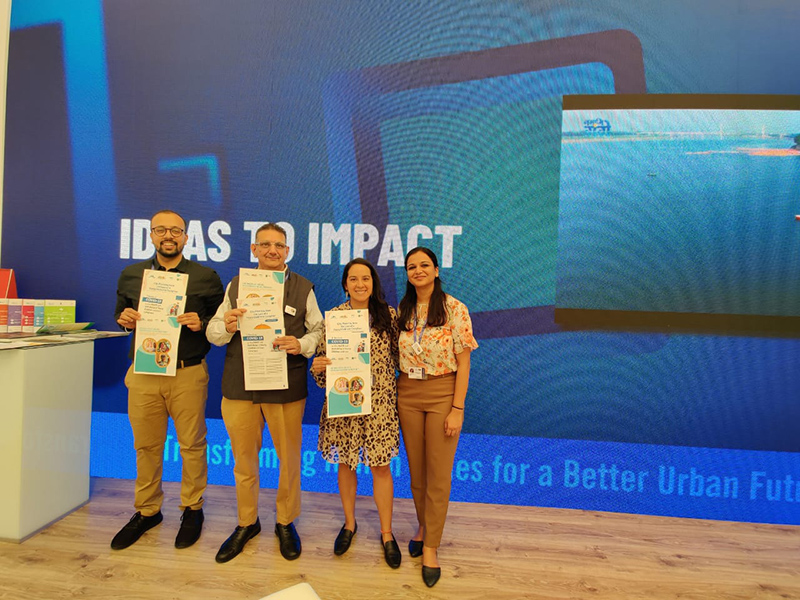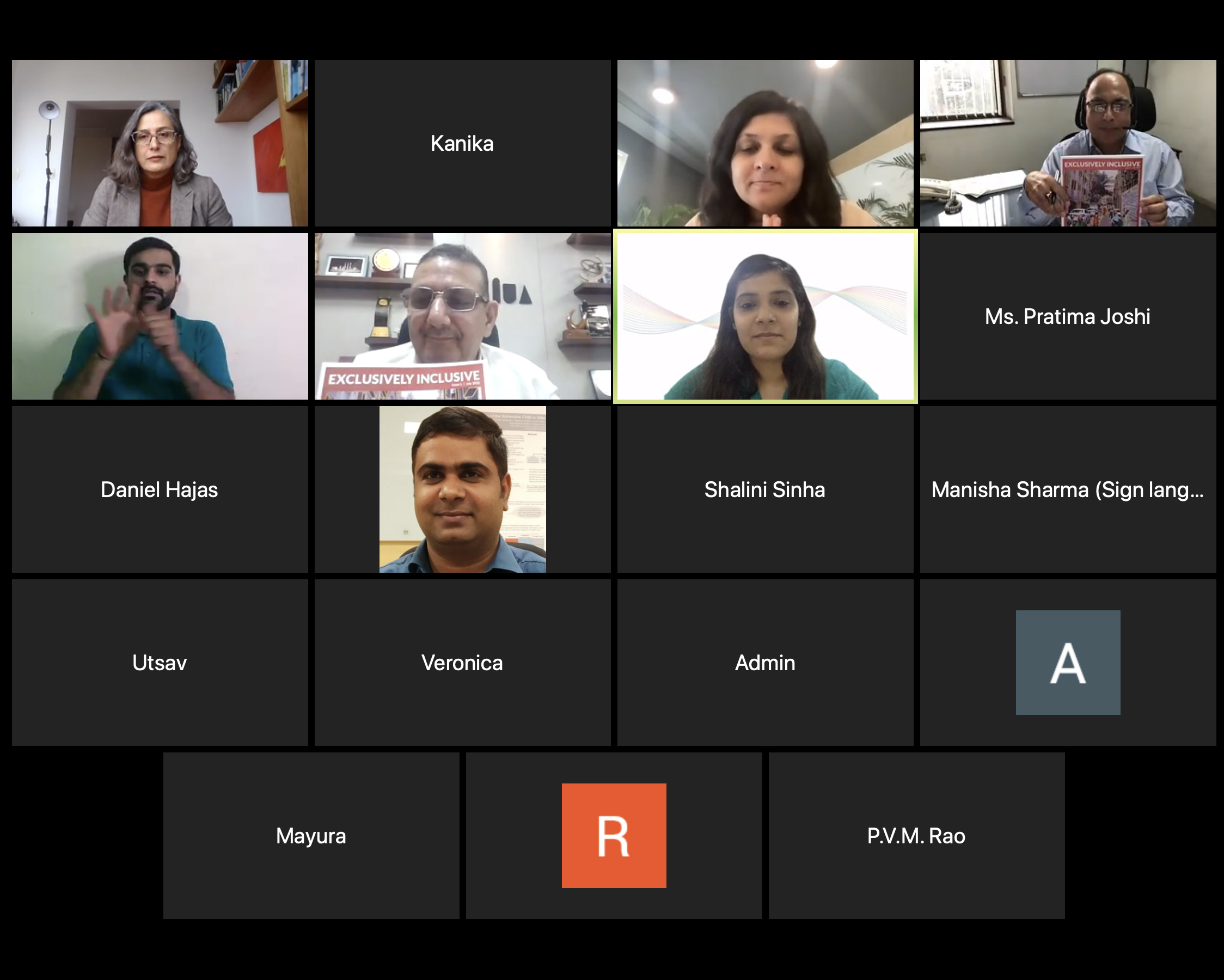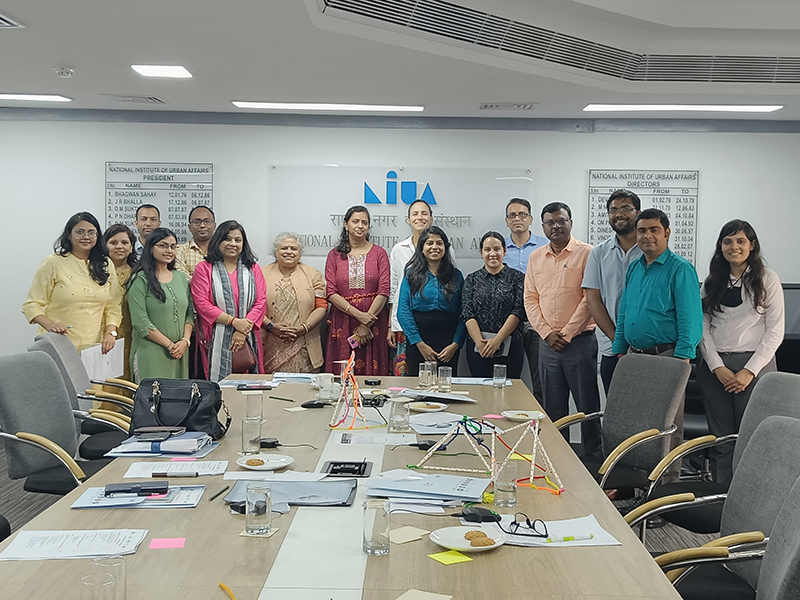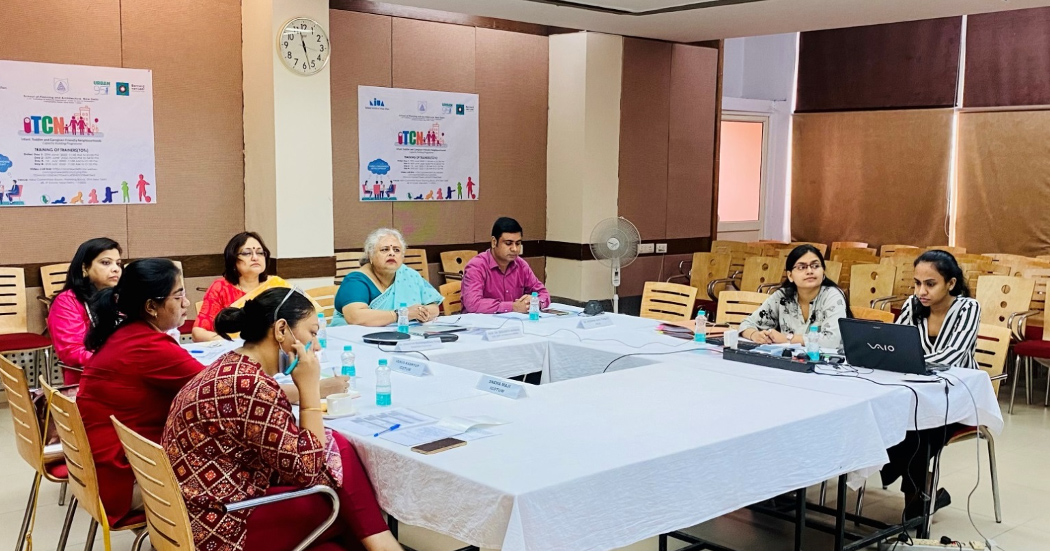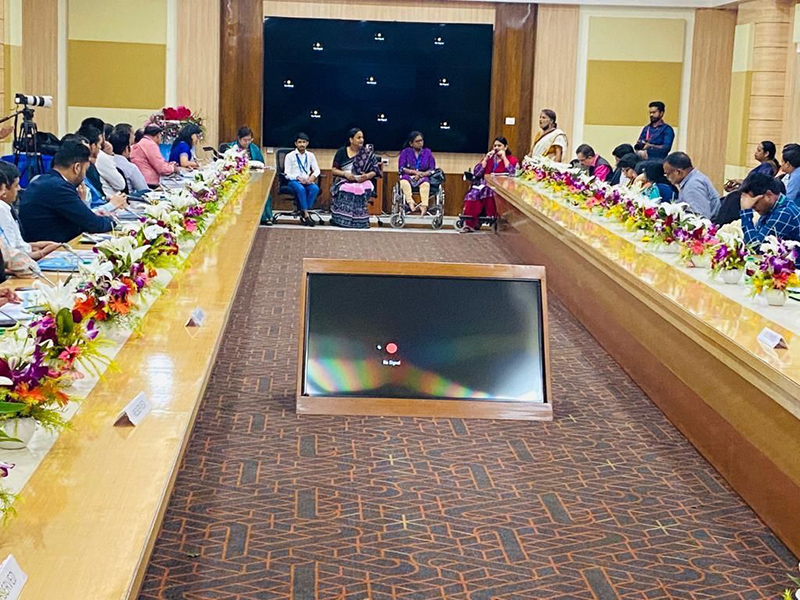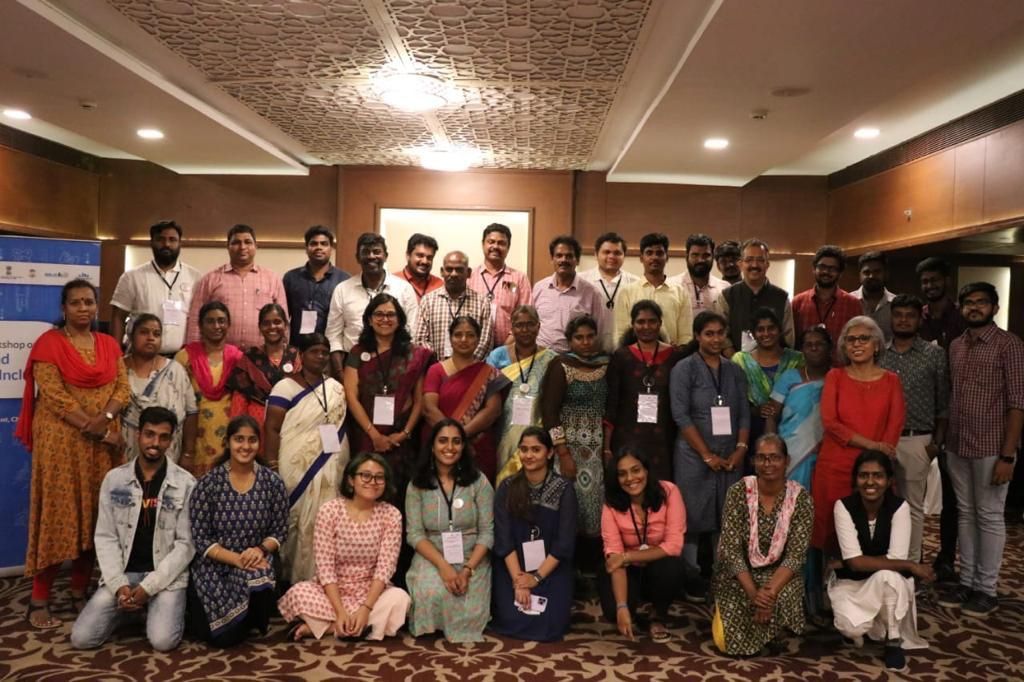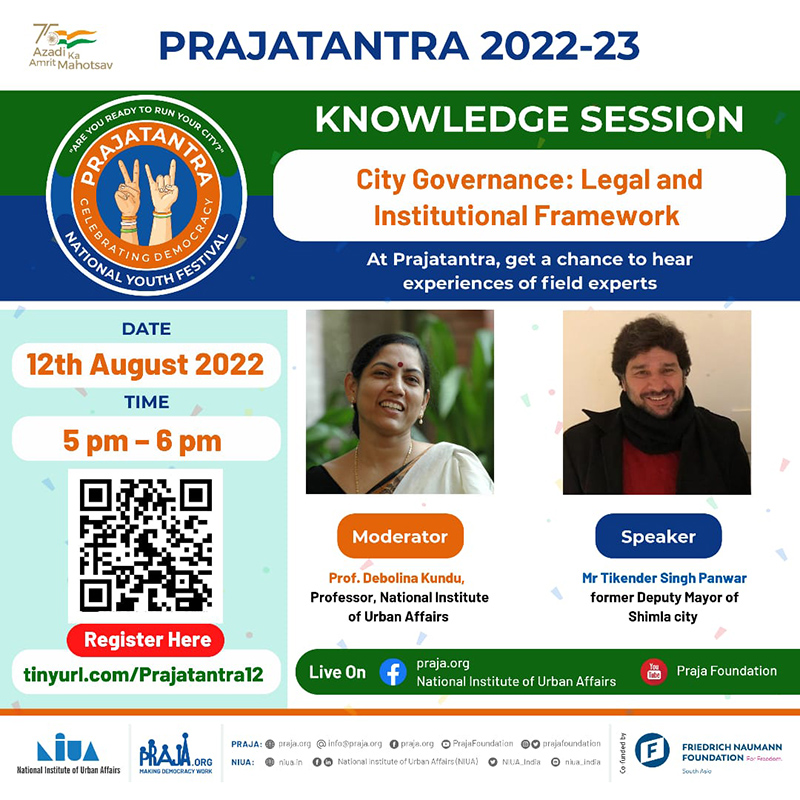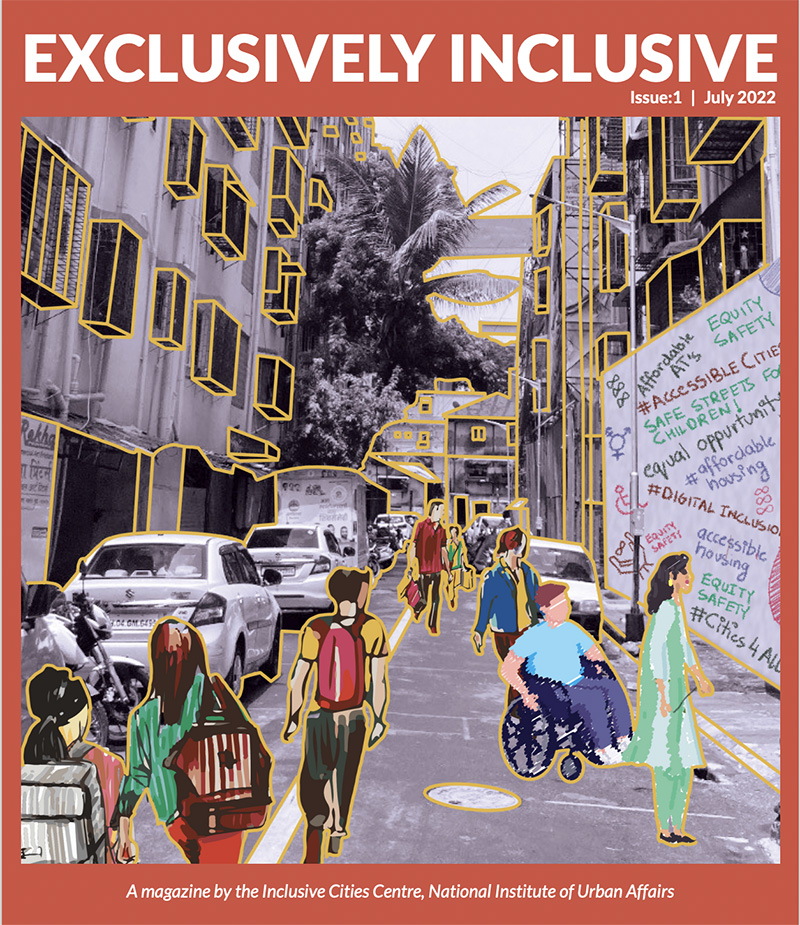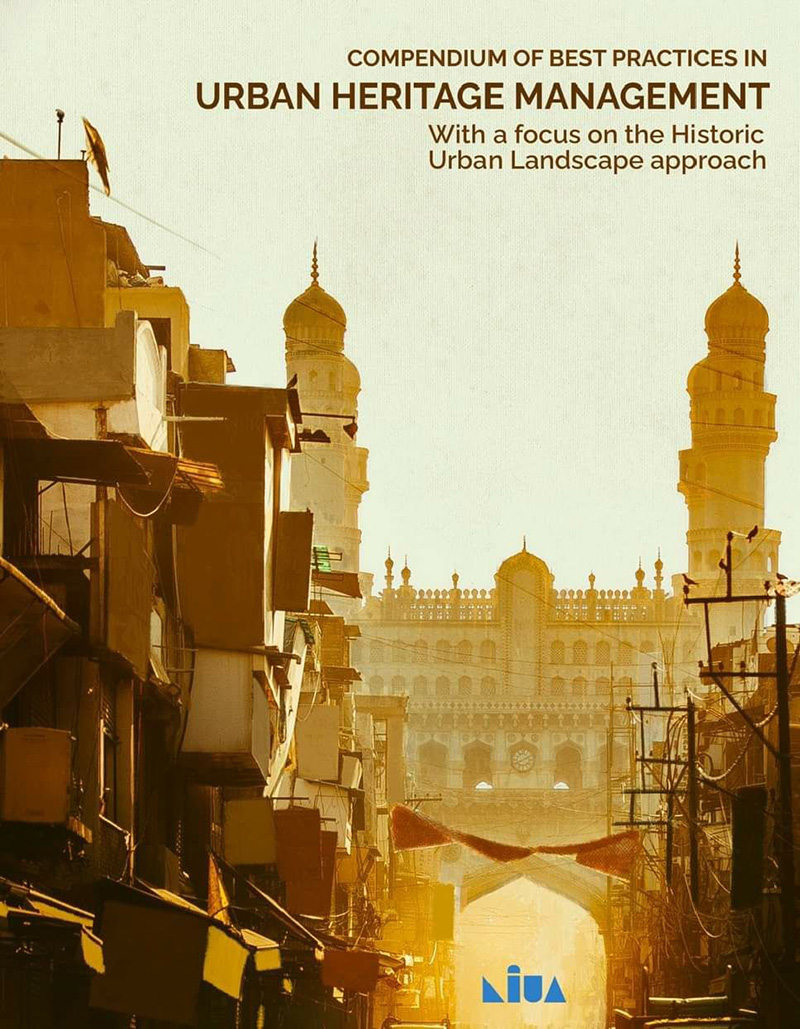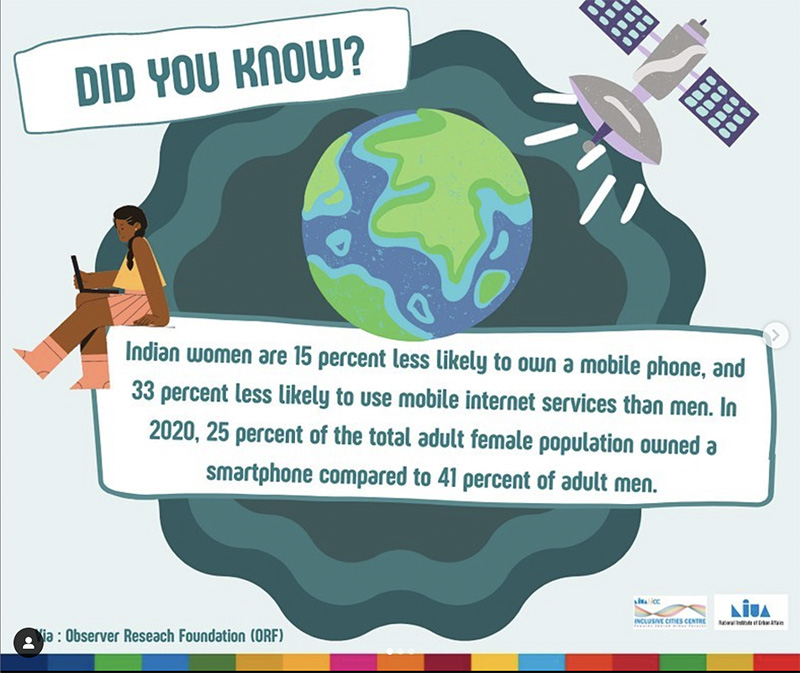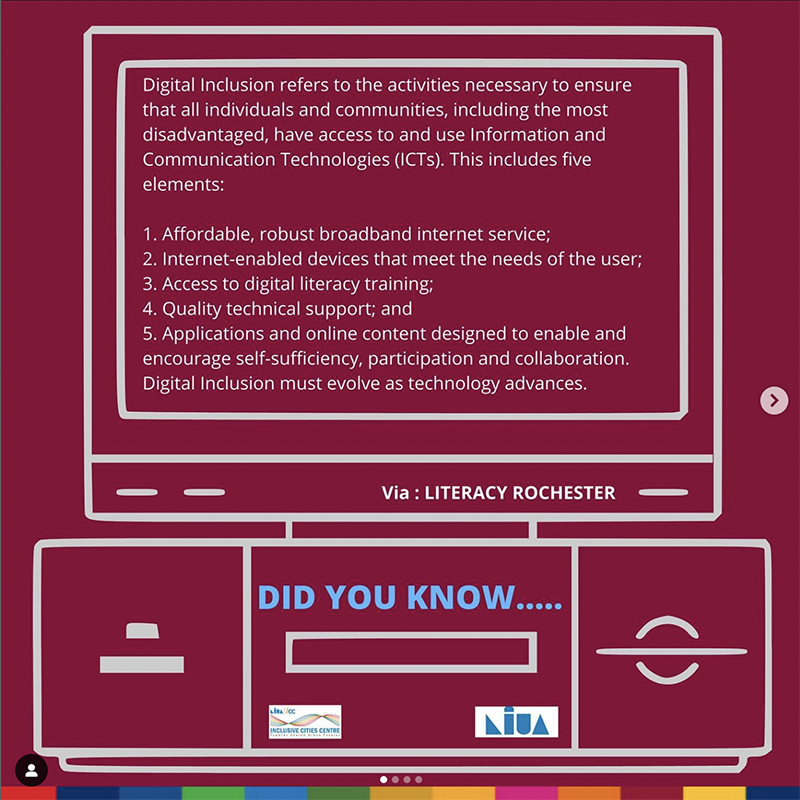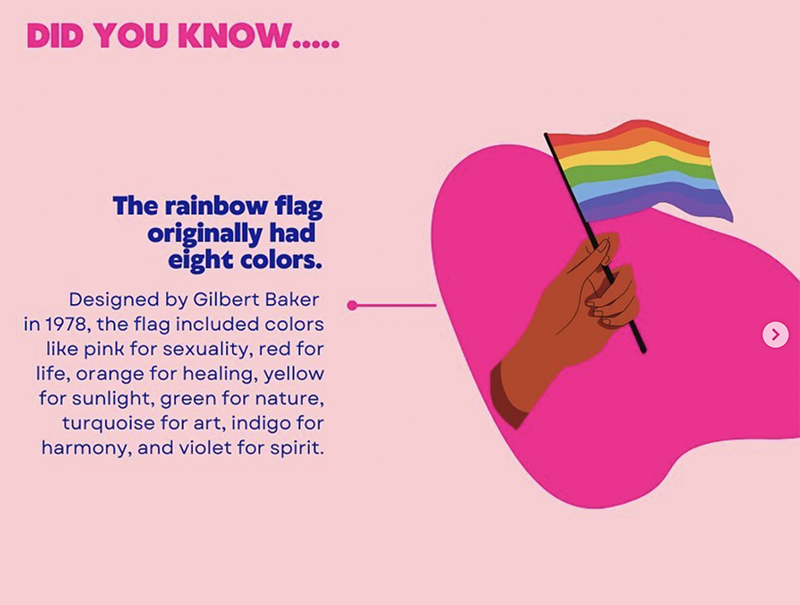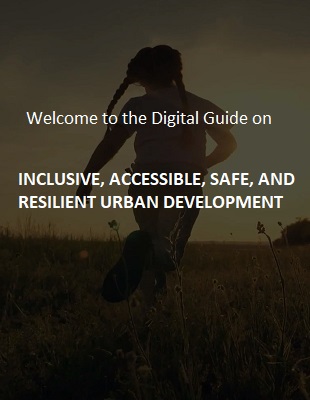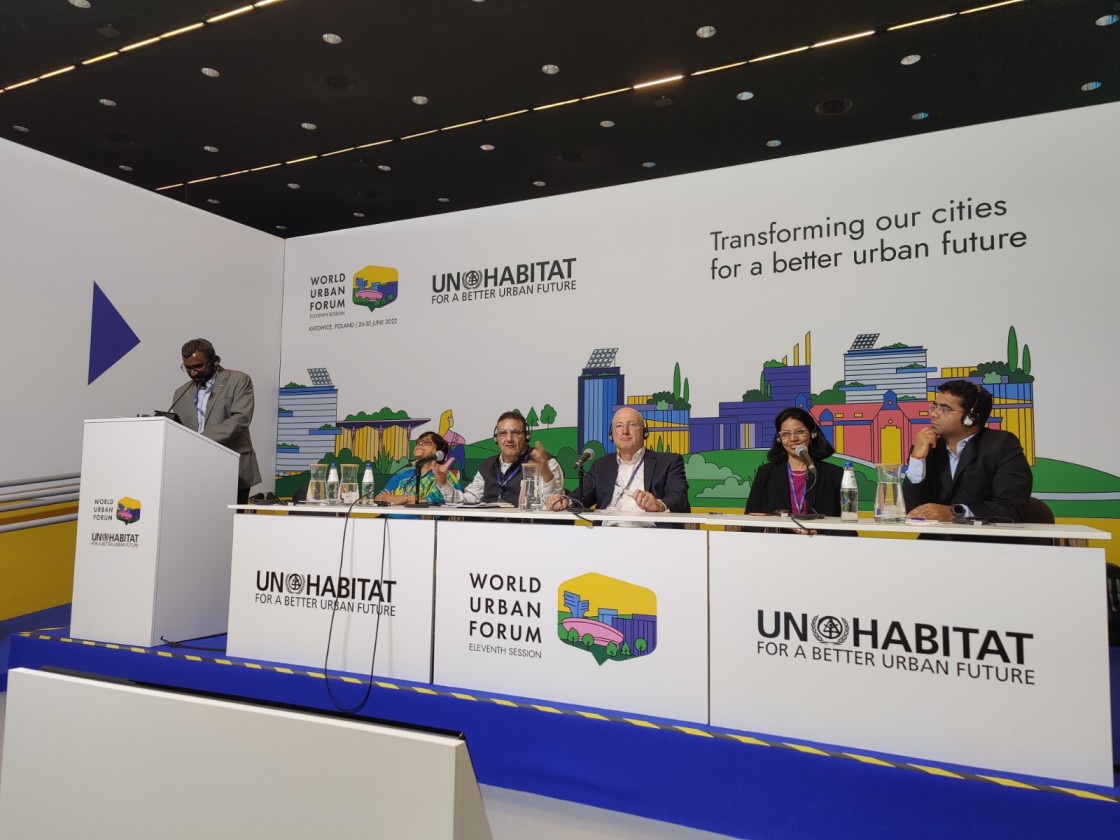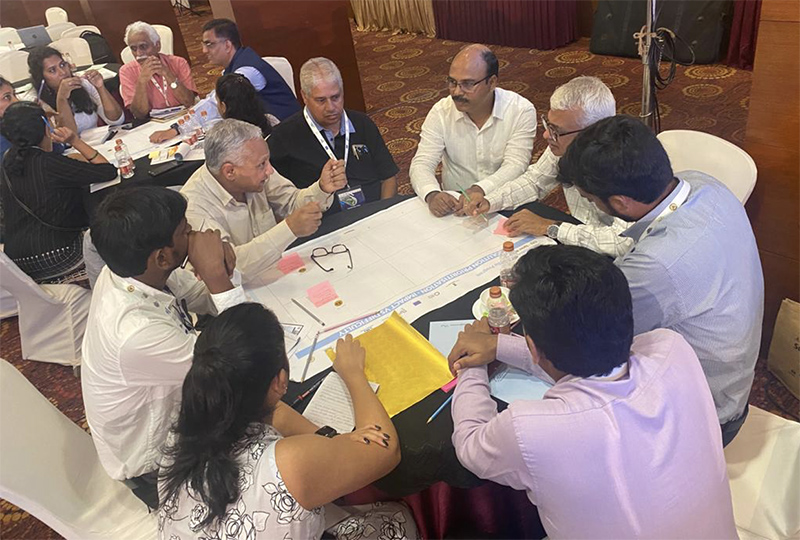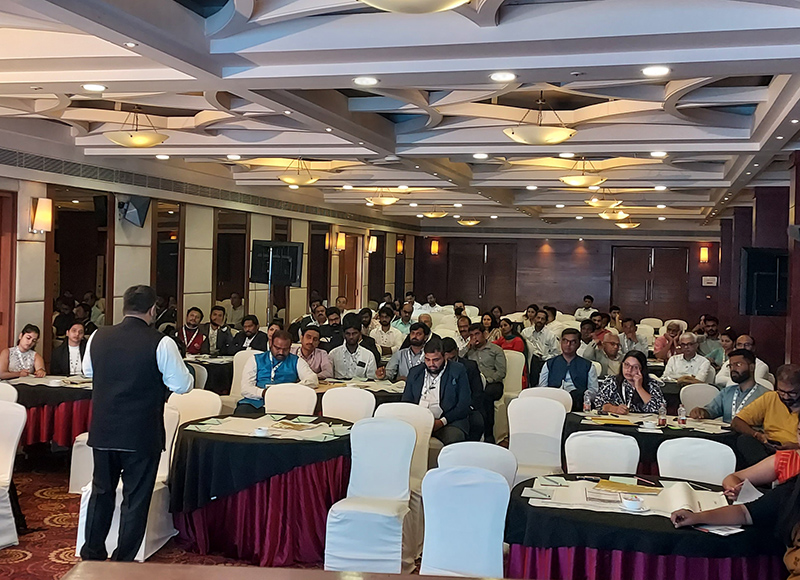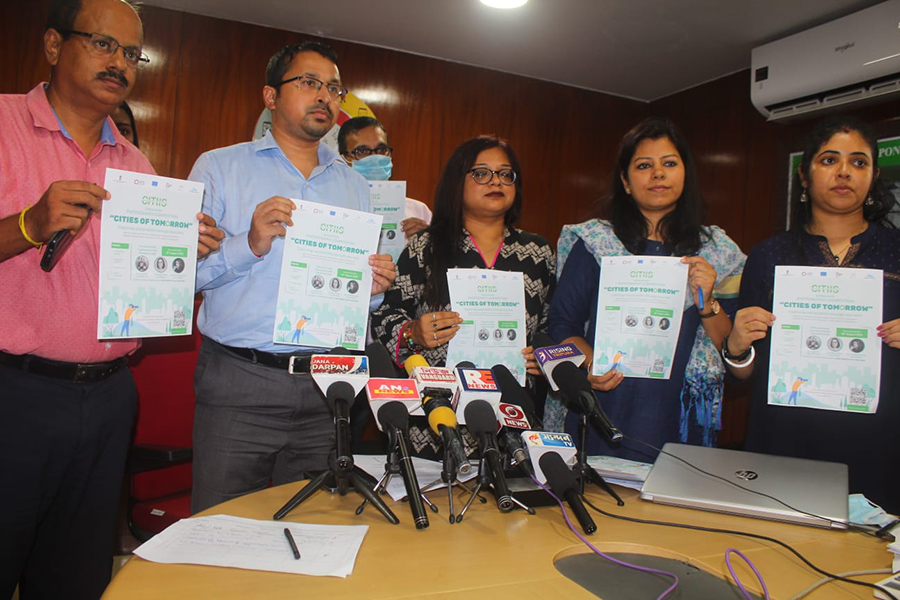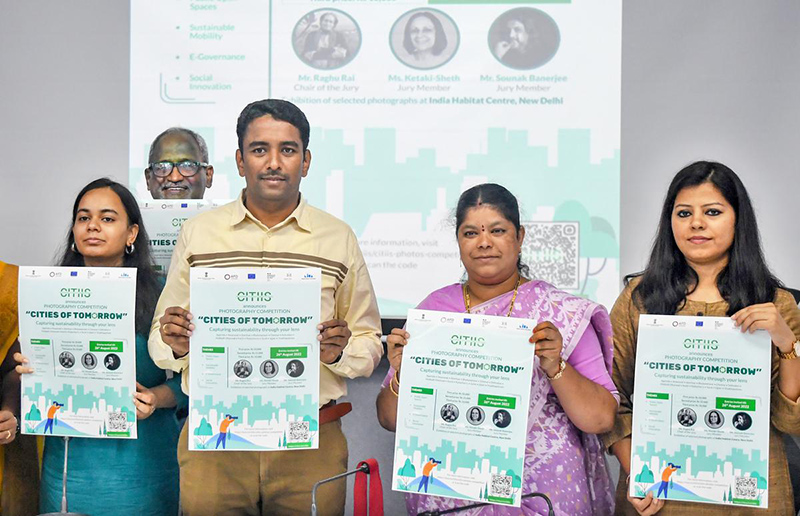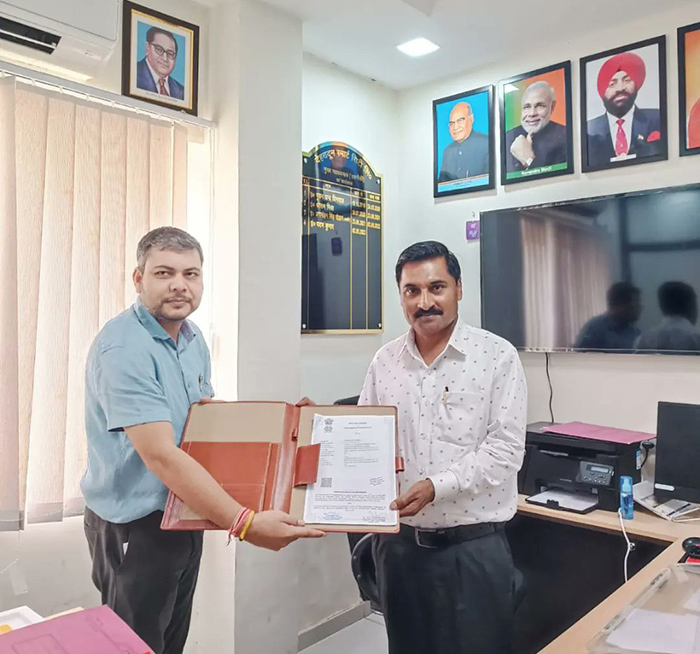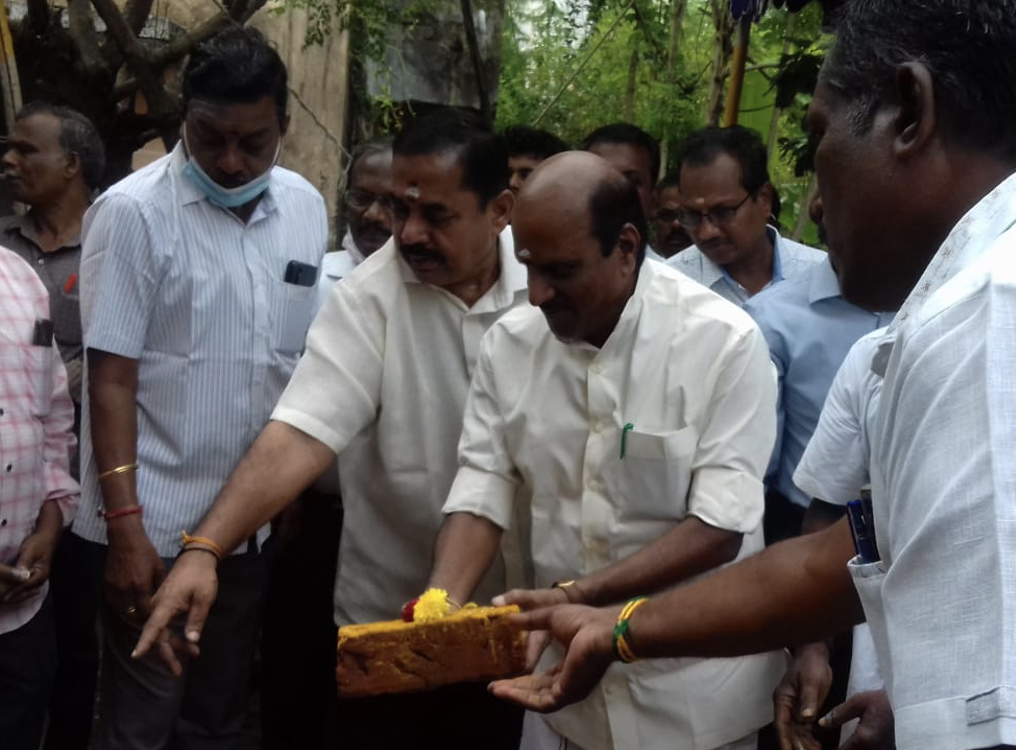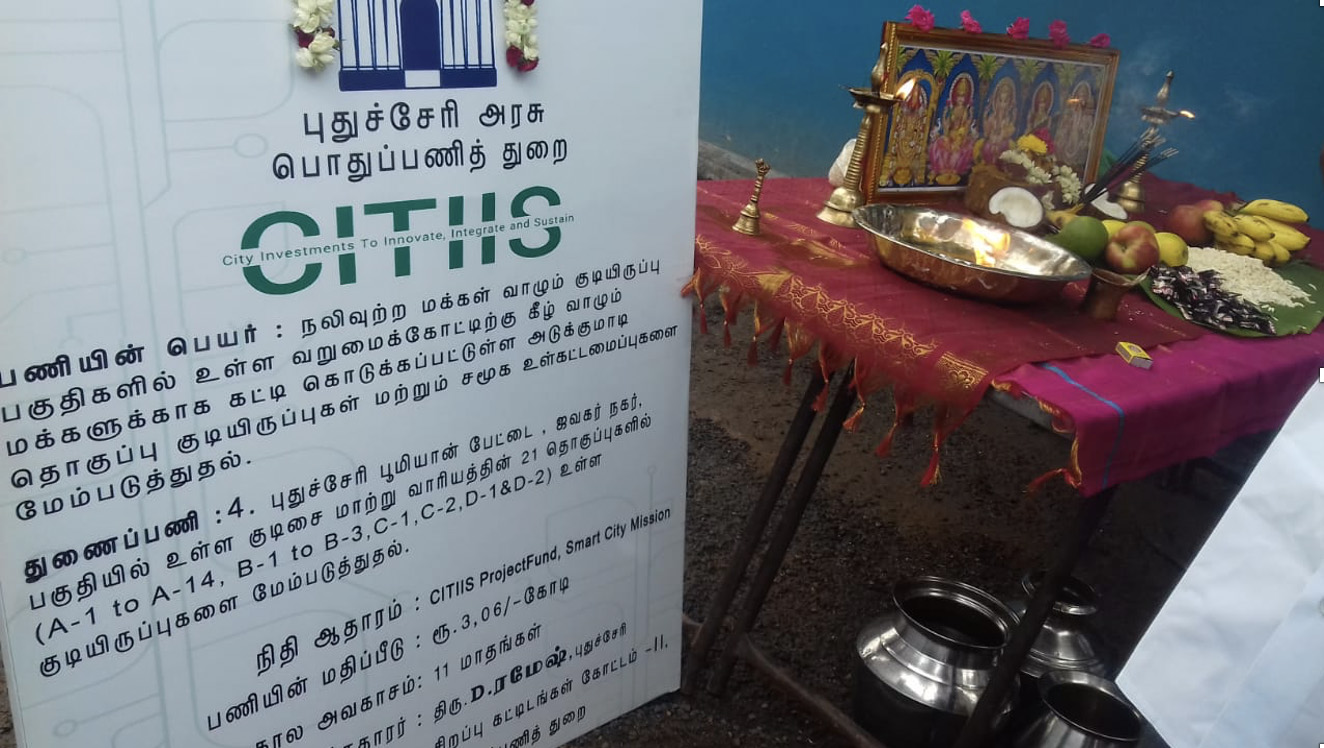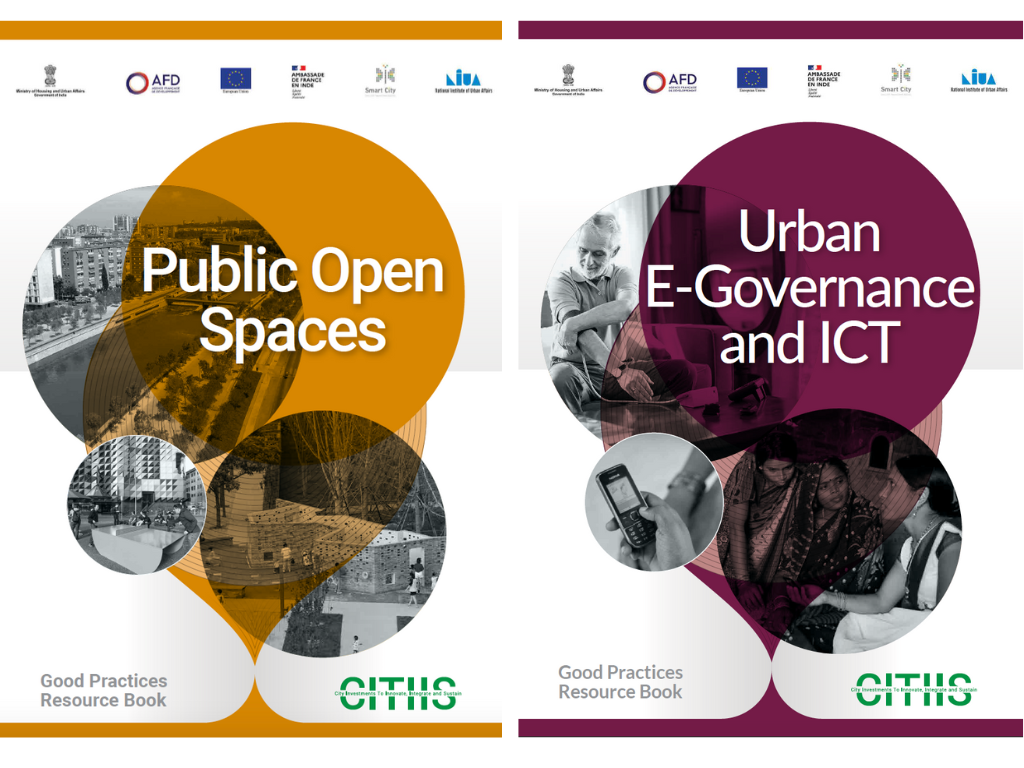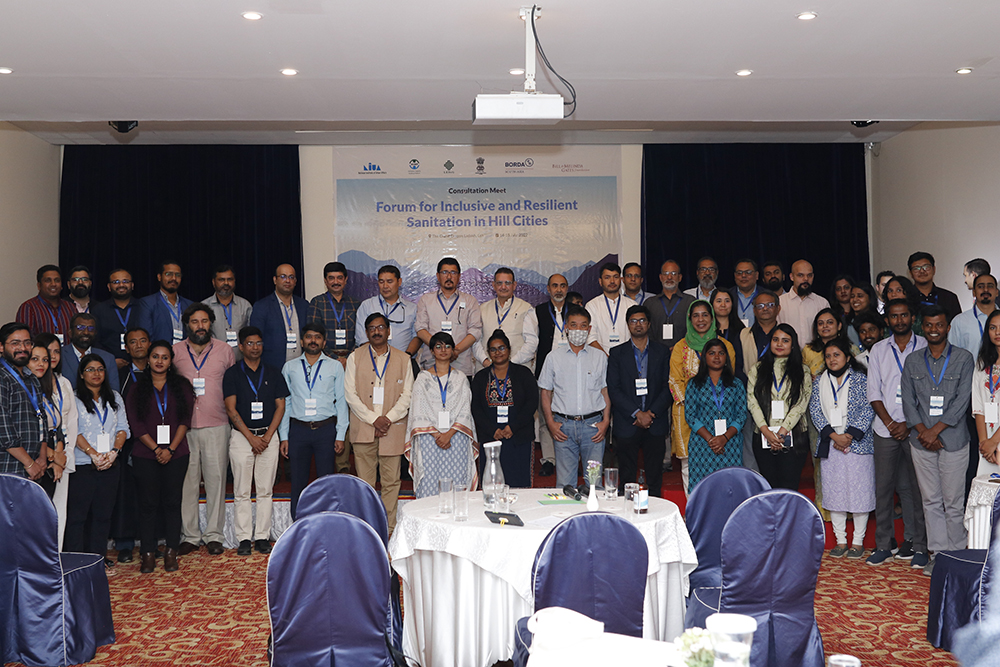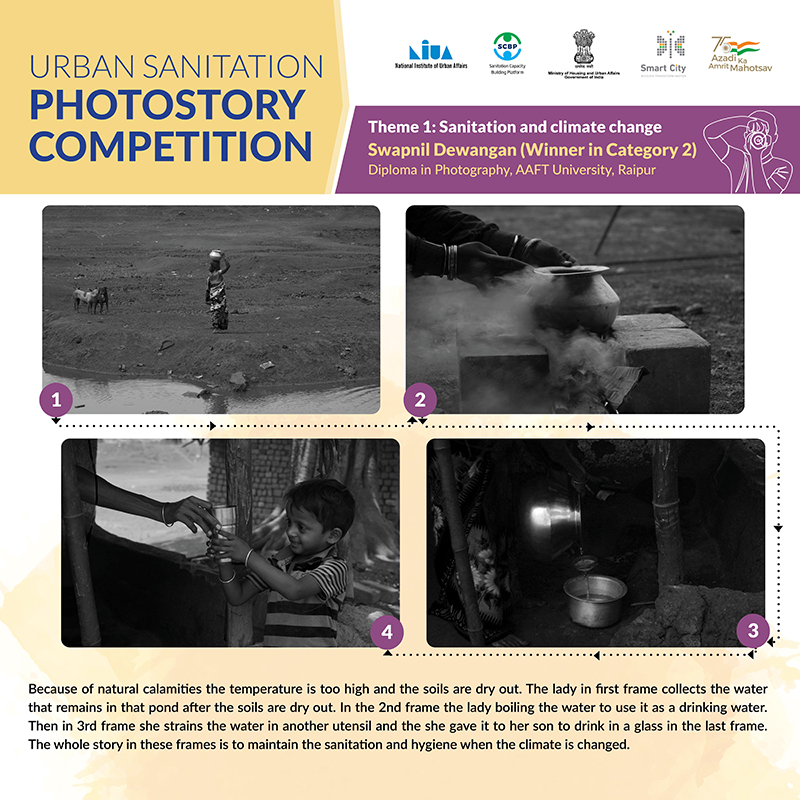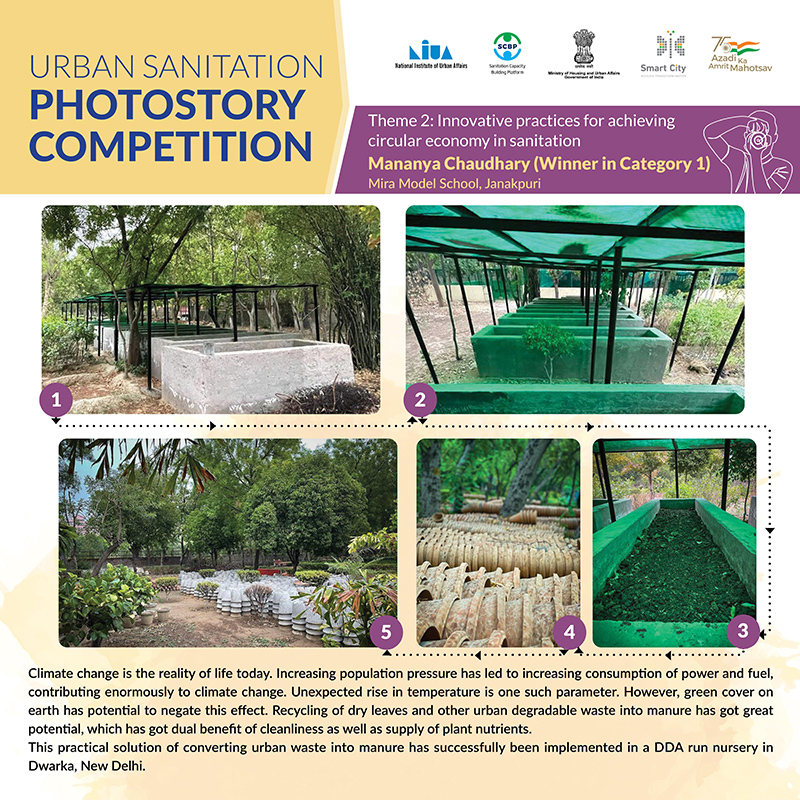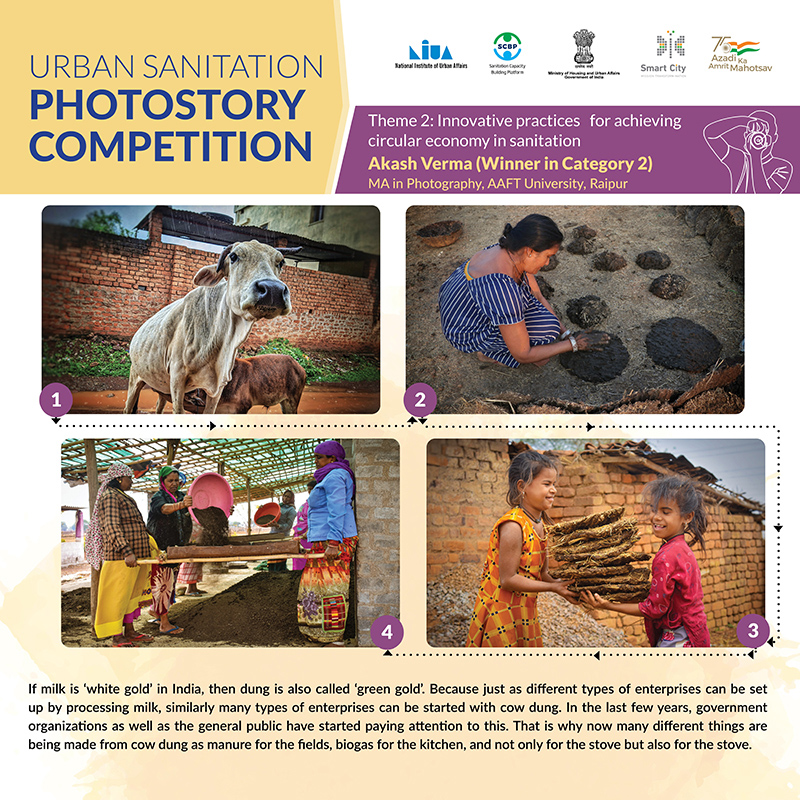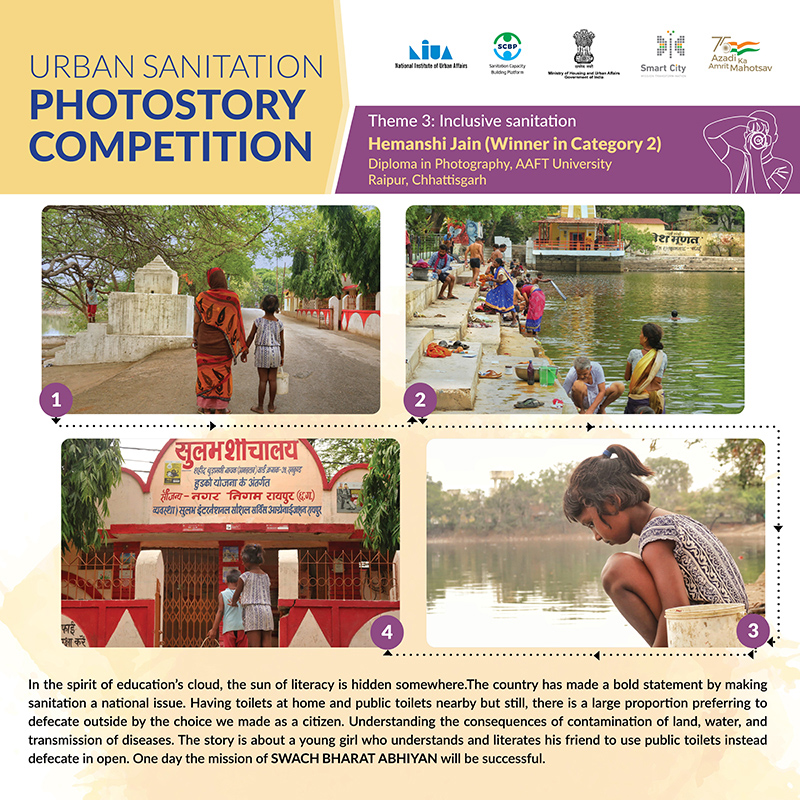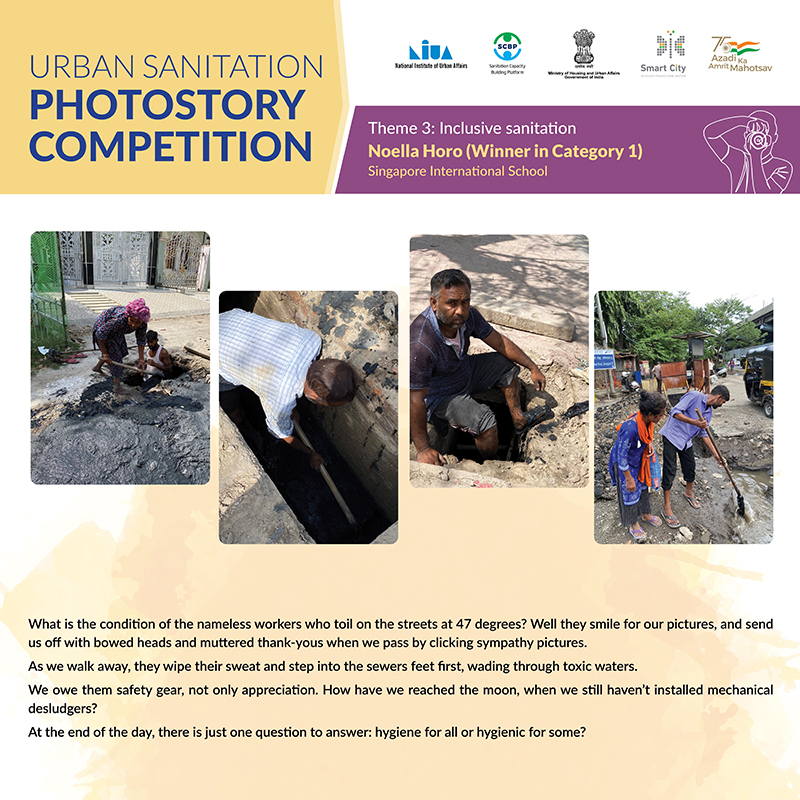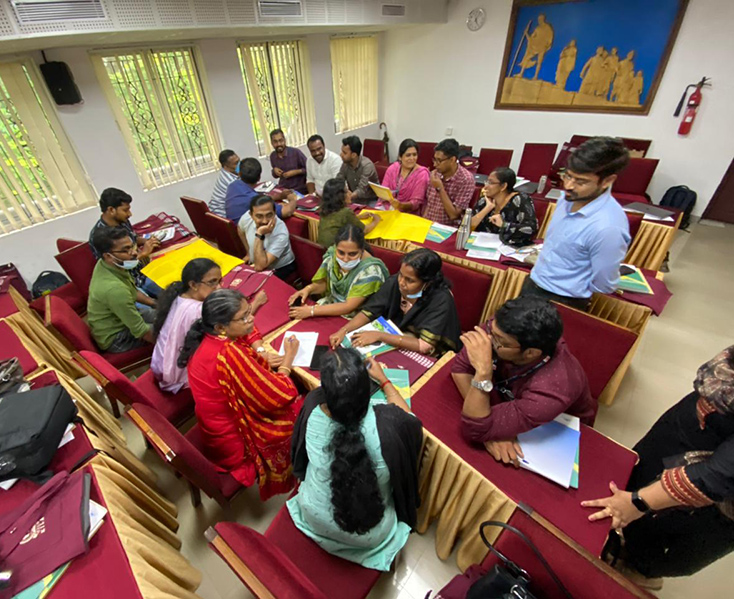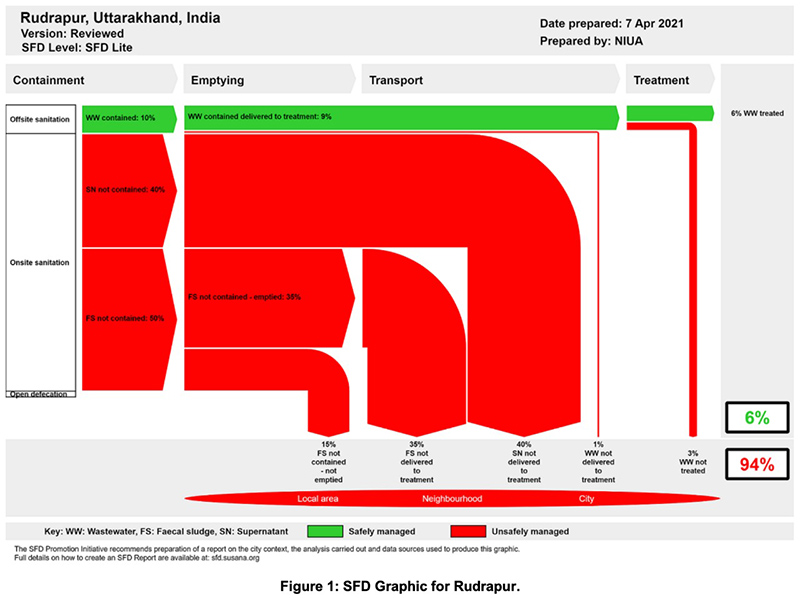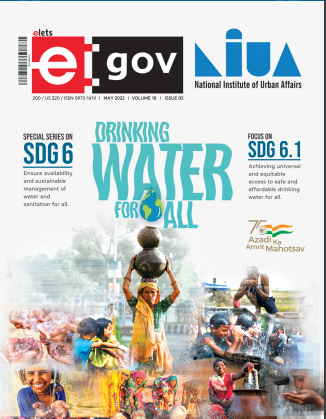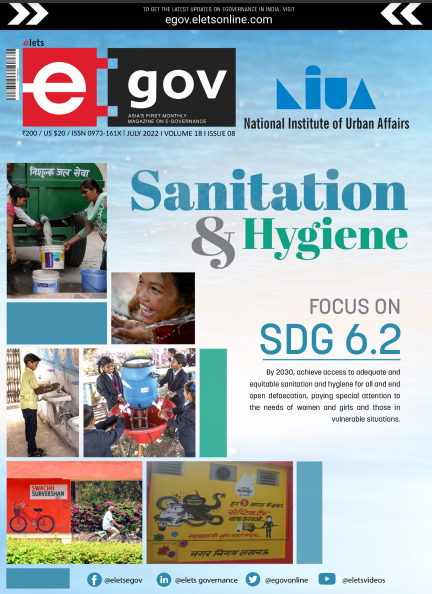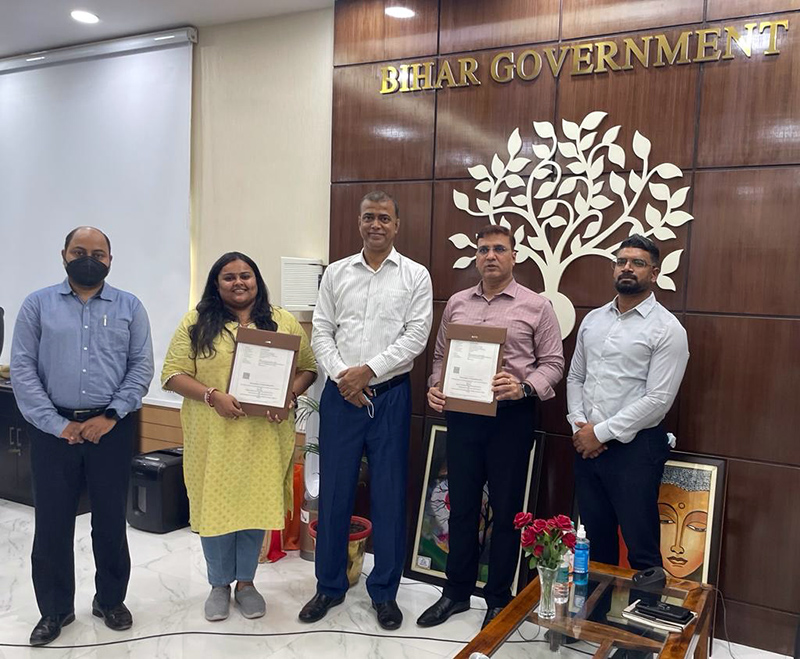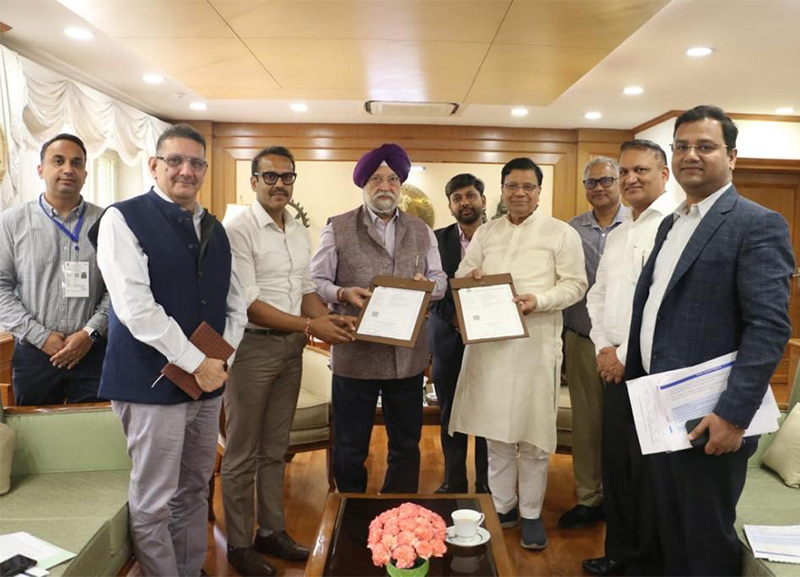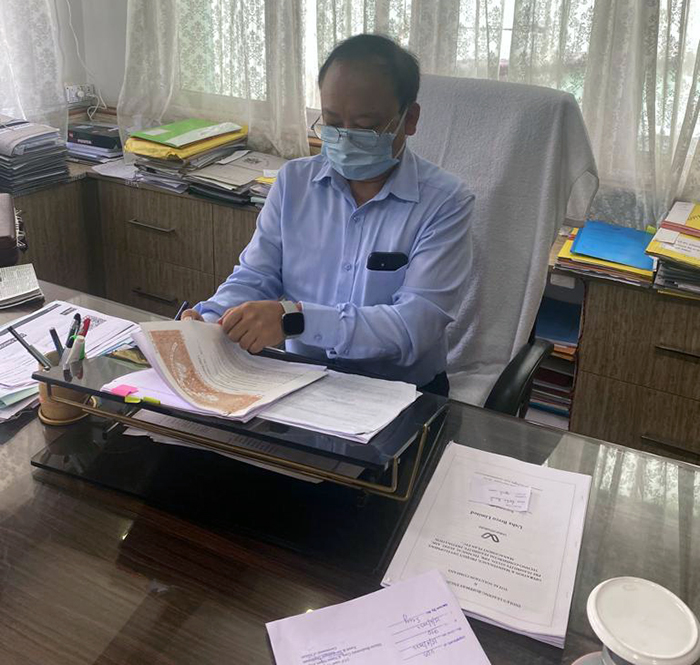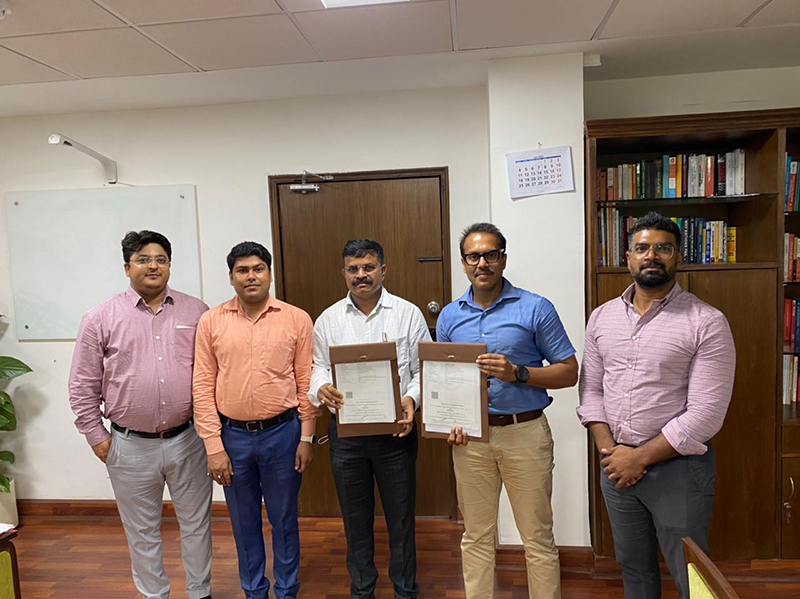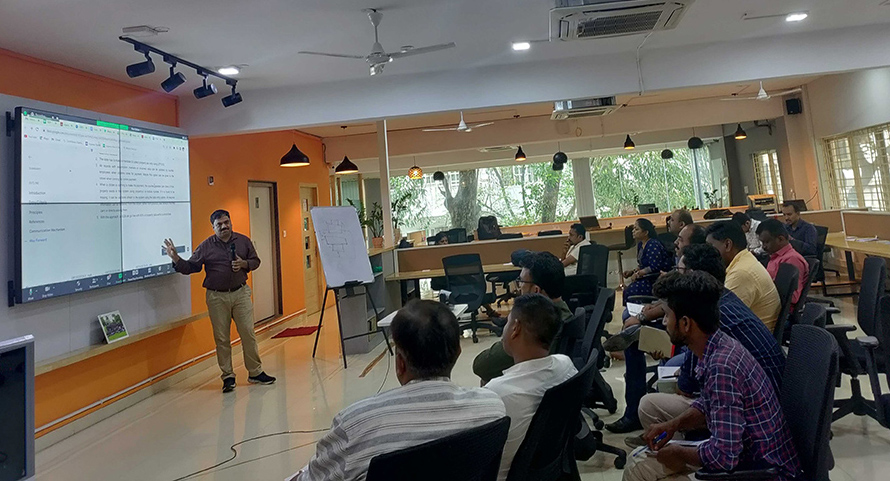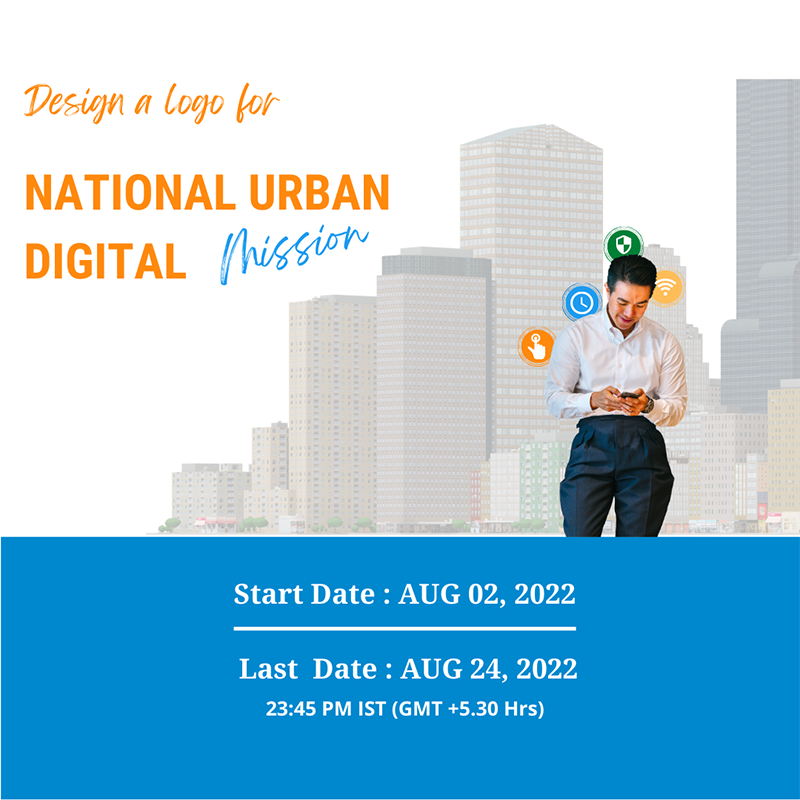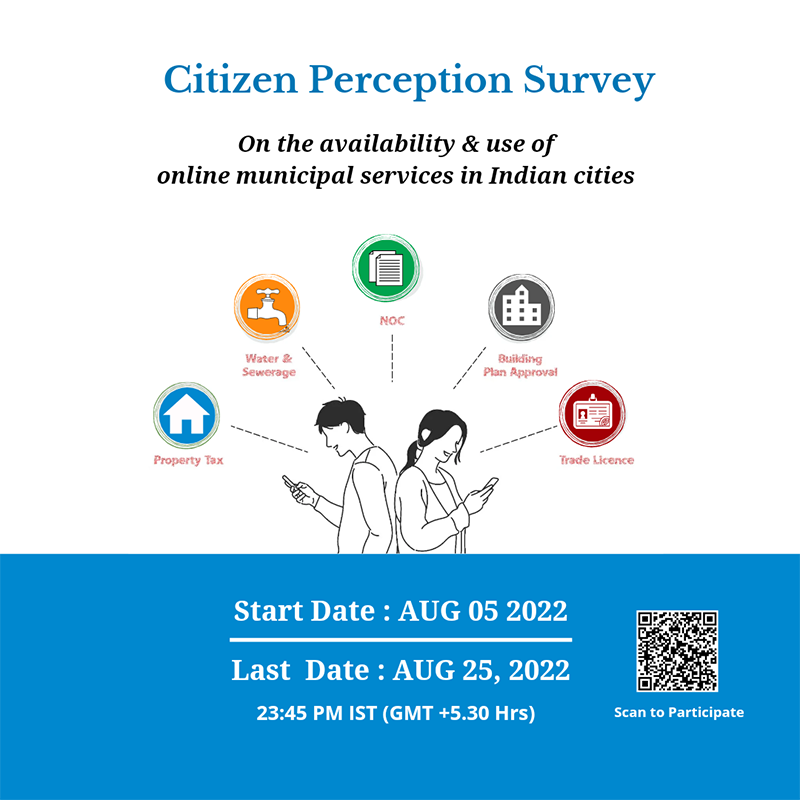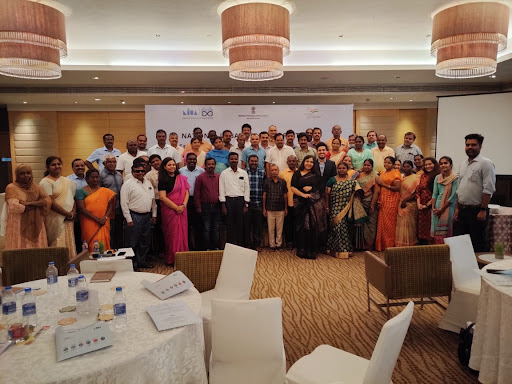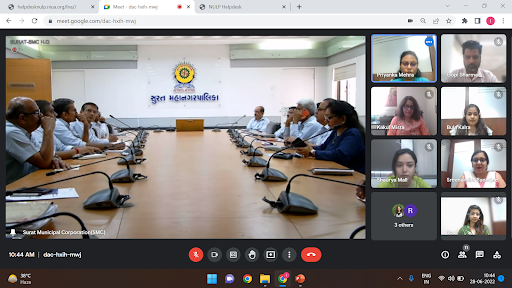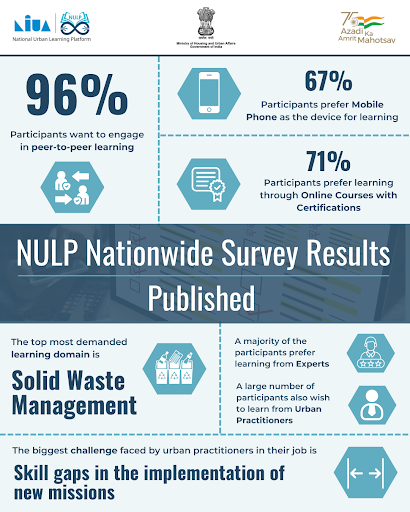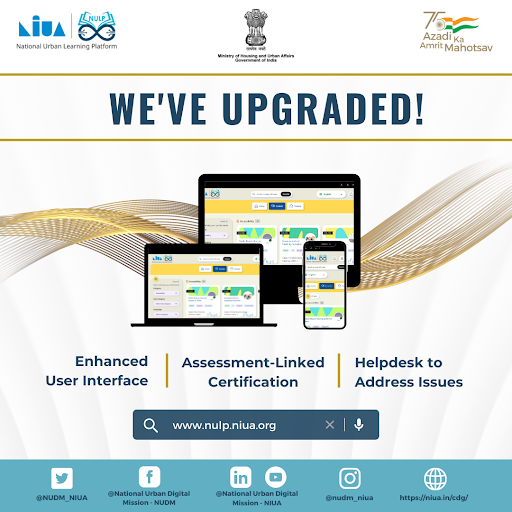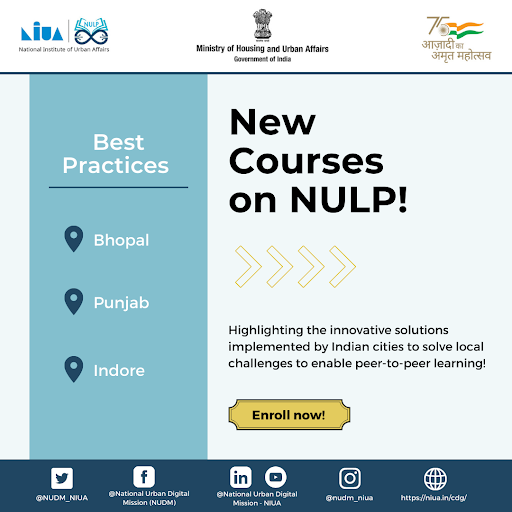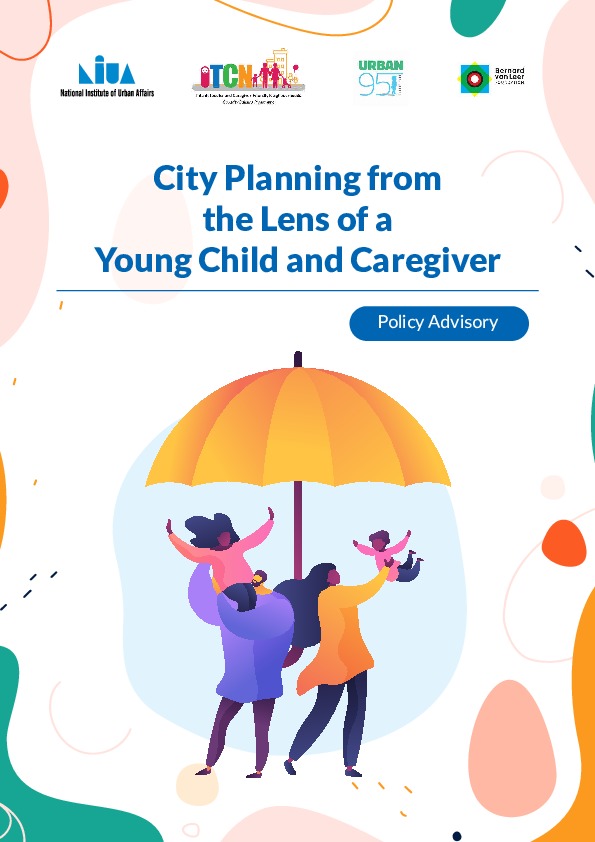
Issue - 3
July-August 2022
Monthly
NIUA at the 11th World Urban Forum
The National Institute of Urban Affairs, for the first time, set up its own pavilion at the World Urban Forum (WUF) at Katowice, Poland. Tuning in with the WUF-11 theme ‘Transforming our Cities for a Better Urban Future’, the pavilion showcased insights on the future of cities based on current impacts, future-trends, challenges and opportunities. It demonstrated how NIUA is adopting an ecosystem approach and nudging multiple stakeholders, both vertically and horizontally, to help build a holistic vision for a sustainable urban future. Various elements such as:- The Diversitree, Colourful hand sketched depiction of a model city and Interactive game of One Earth, One Wish and One Word described the story.
NIUA showcased India’s efforts in:
- Solutions and approaches toward climate change, sustainable development and urbanisation;
- Exploring collaborative opportunities for innovations and knowledge management, including furthering opportunities for South-South cooperation.
- In the 5 days from June 26 to June 30, 2022, NIUA hosted 8 panel discussions, 8 launches and 3 Networking events with our partners.
As a think-tank driving the urban story of India, four trends stood out as key takeaways for NIUA: Localise and Interlink, prosperity- Sustainability nexus, Partner and Collaborate, Cities for All.
Inclusive Cities Centre (ICC)
ICC at the World Urban Forum
Inclusive Cities Centre (ICC)
Kanika Bansal and Utsav Choudhury represented the Inclusive Cities Centre at the World Urban Forum held in Katowice city, Poland. The training module ‘Fundamentals of Disability Inclusion’ developed by the BASIIC programme in collaboration with AIILSG was launched. The team also presented India's narrative on disability inclusion by participating as panellists and participants at various stalls and panel discussions on inclusion.
The knowledge products developed under the ITCN Capacity Building Programme were also launched during the event. These included - Knowledge Needs Assessment (KNA) Study, a policy brief which looks at the impact of COVID-19 on the health and well-being of young children and their caregivers and a policy advisory which recommends specific areas of intervention for creating ITC-friendly cities.
ICC International Webinar on ‘Building Inclusive Digital Infrastructure for Resilient and Sustainable Cities’
Inclusive Cities Centre (ICC)
The Inclusive Cities Centre, commemorating its first anniversary (29th June 2022), organised an international webinar on 1 August 2022 with a focus on resiliency and sustainability. The panellists discussed:
- Strategies to bridge the digital divide for integration of the informal sector in the city value chain;
- Use of open data platform to help integrate informal settlements in city development; and
- Inclusion of persons with disabilities through accessible ICTs and assistive technologies.
The participants included practitioners from various urban spheres, who engaged in diverse conversations on strategies required for the digital, social, spatial and economic inclusion of the marginalised communities.
Two related publications were launched - ICC magazine ‘Exclusively Inclusive’ and ‘ Compendium of Best Practices in Urban Heritage Management.
Workshop on Early Childhood Development
Infant, Toddler and Caregiver-Friendly Neighbourhoods (ITCN)
ITCN Capacity Building Programme successfully organised a co-creative learning workshop on 5 August 2022, in partnership with BvLF. The workshop was conducted by Ms. Victoria Chavez and Ms. Laura Ochoa Foschini, experts on Early Childhood Development (ECD) from the BvLF international team.
The participants included experts from the Programme partners - BvLF, CEPT Research & Development Foundation (CRDF) - the Training of Trainers (ToT) agency, School of Planning and Architecture (SPA) Delhi – the Lead Academic Institute, All India Institute of Local Self Government, Centre for Good Governance, Dr. R. S. Tolia Uttarakhand Academy of Administration, Engineering Staff College of India, Kerala Institute of Local Administration, Regional Centre for Urban and Environmental Studies, Lucknow, Jadavpur University, NIT Rourkela, Indira Gandhi Delhi Technical University for Women, NIT Hamirpur, Manipal School of Architecture and Planning, Karnataka, and Sir J J College of Architecture.
The participants were divided into 6 teams and each participant stepped into the shoes of young children and caregivers to understand their latent needs. Two activities were organized-
- Brain Architecture Game; and,
- Tracing the life of a young child or their caregiver using the medium of hand drawings.
The sessions proved to be a revelation and pushed the participants to think of needs or situations related to young children and their caregivers that often go unnoticed.
ITCN ToT for Academic Institutions
Infant, Toddler and Caregiver-Friendly Neighbourhoods (ITCN)
The ITCN team at NIUA collaborated with SPA Delhi to organise a Trainng of trainers (ToT) for faculty members of 6 academic institutes from 29 June - 2 July 2022. The participants were on-boarded by SPA Delhi to deliver an academic certificate programme on ITCN for young professionals.
Similarly, the Government officials have been trained under 'Orientation Level Course: Infant, Toddler, Caregiver-Friendly Neighbourhoods (ITCN) Capacity Building Programme'. The course is now live on NULP Click here
Regional Workshops on ‘Gender and Disability Inclusion in Indian Cities’
Building Accessible, Safe, and Inclusive Indian Cities (BASIIC)
NIUA's BASIIC Programme in partnership with the United Nations India and Design Bridge Foundation developed and organised 4 regional workshops in:
- Pune from 30 June to 1 July 2022
- Chennai from 4 July to 5 July 2022
- Varanasi from 14 July to15 July 2022
- Bhubaneswar from 3 August to 4 August 2022.
216 participants attended these training sessions from 28 cities across the country.
Conducted over 16 hours, the workshops also highlighted the need for systemic training on the Harmonised Guidelines and other GOI mandates on universal access in a phase-wise manner. It included exposure visit-cum-trainings on various facets of disability Inclusion in Indian cities to engage a range of stakeholders, which included city officials, practitioners and user groups.
The training was designed to:
- Improve awareness regarding the need for improved accessibility for persons with disabilities
- Focus on legal frameworks and commitments that make accessibility mandatory in planning and implementation.
- Encourage different approaches to mainstreaming inclusion through innovative and practical methods for ULBs, SPVs and project management teams in all stages of the project cycle including the preparation of master plans, DPRs, RFPs and other related bidding processes for vendor selection as well as monitoring and evaluation mechanisms.
Additionally, there was a strong inclination to create a more practical and robust monitoring and evaluation system.
Prajatantra: National Youth Festival celebrating City Governance
Youth Forum
The Inclusive Cities Centre in collaboration with Praja Foundation is organising Prajatantra 2022-23, a Youth Forum which kickstarted on 10th August 2022 and will go on till 29th January 2023. In commemoration of Azadi ka Amrit Mahotsav, Prajatantra will identify 75 youth champions to promote citizen engagement for improving the ease of living in Indian cities. The forum is the platform for youth to advocate what they believe in through activities such as debates and discussions that facilitates the youth's mind toward city governance.
To create a new success story in city development, it is essential to understand the workings of our urban institutions and how they can be improved. NIUA and Praja Foundation, through Prajatantra bring to the youth of India a celebration of city governance in the 75th Independence year. A series of knowledge sessions were organised such as:
- City Governance: Legal and Institutional framework - The session focused on the authority and responsibilities of local governments. The session also concentrated on the legal and constitutional foundation for local administrations. The session was moderated by Dr. Debolina Kundu, Professor, National Institute of Urban Affairs with Tikender Singh Panwar, Former Deputy Mayor - Shimla Municipal Corporation as the panelist.
- Knowledge Session on Municipal Finance - The session provided insights into the structure, sources, expenditure and financial decentralisation of municipal finance. It was moderated by Dr. Debarpita Roy, Research Fellow at the Centre for Social and Economic Progress with Dr. Ravikant Joshi, Urban Finance and Management Specialist and Former Chief Accounts Officer of Vadodara Municipal Corporation.
Stay tuned for more updates.
To know more about the Youth Festival, click here
Inaugural issue of the ICC Magazine - 'Exclusively Inclusive'
Inclusive Cities Centre (ICC)
At the international webinar on ‘Building Inclusive Digital Infrastructure for Resilient and Sustainable Cities,’ ICC launched the magazine ‘Exclusively Inclusive’ that narrates stories of inclusive development, especially digital inclusion in the Indian context. It presents the perspectives and discussions about the vulnerable sections of the society including the urban poor, women, children, youth, and persons with disabilities, through the medium of narrations and illustrations.
Compendium of Best Practices in Urban Heritage Management
Ahmedabad World Heritage City: Preparation of Heritage Conservation Plan (AWHCP)
The Compendium of Best Practices in Urban Heritage Management was launched at the International seminar on 1st August, 2022, commemorating the first anniversary of ICC.
The compendium, with a focus on the Historic Urban Landscape Approach features a compilation of different practices from cities across the globe to preserve the cultural heritage in growing urban cities, using strategic planning, knowledge and financial tools.
ICC Blogs
Inclusive Cities Centre (ICC)
ICC in its blog series explored the topics of education, gender and digital inclusion. The blog ‘No Study Makes Jack a Dull Boy?’ talks about how education has not changed nearly as dramatically (since the British era in our country) as it did during the pandemic for everyone concerned, whether students, teachers, institutions, or all other critical participants in the education sector, after March 2020, when coronavirus altered the educational landscape. Everyone, regardless of whether they had experience learning online, had to adjust, adapt, and jump on the digital bandwagon.
‘The Future Is Women?’ blog explored how the digital divide has a deep gender gap within it — and connectivity strategies that aim for universal access must address this. The digital divide is sexist. 'Digital inclusion does not exist without women’s inclusion.'
‘The Digital Pandemic’ blog talks about how the digital gap prior to the pandemic has only widened because of the COVID-19 pandemic. Go through the blog series to know how it affects 3 key major parts of society most affected by this digital epidemic, i.e, education, women, and the elderly population.
During Pride Month, the team explored ‘Inclusivity from LGBTQ+ Lens’ to understand what it means to be inclusive from the LGBTQIA+ community’s lens.
What's Coming Up!
Climate Centre for Cities (C-Cube)
Networking Event at the 11th World Urban Forum 2022
Climate Centre for Cities (C-Cube)
Climate Centre for Cities (C-Cube) at the National Institute of Urban Affairs (NIUA) organised a Networking Event at the World Urban Forum held at Katowice, Poland on 28th June 2022 titled ‘Fostering urban data observatories as local level resilience centres’.
C-Cube facilitated a dialogue to develop meaningful frameworks for institutionalising urban data observatories as resilience centres; and support better, more inclusive planning and governance of cities. Moderated by Dr. Umamahesh Rajasekar, Chair Urban Resilience, Global Alliance Cities Network at the NIUA, the panel was introduced by Mr. Hitesh Vaidya, Director, NIUA, who emphasised on the importance of data and its relevance in the ecosystem approach that the institution promotes in resilience building within cities. The event stimulated a healthy dialogue across academia, urban authorities, and citizens on the relevance of designing people-centric urban data observatories as an integrating platform for urban resilience and local actions.
Good practices and approaches were shared to help the participants get a holistic perspective on the role of data observatories in building ground zero/ local level resilience. The panel saw the presence of esteemed panelist’s including Ms. Vaishali Nandan Project Head, Climate Smart Cities, Deutsche Gesellschaft für Internationale Zusammenarbeit (GIZ) GmbH, Dr. Himanshu Shekhar, Associate Academic Officer, United Nations University, Dr. Helmut Schön, Principal Economist, KfW, Germany and Dr. Debjani Ghosh, Associate Professor, NIUA.
'Sustainable Cities India Program' implements first City Sprint Workshop in Hubballi-Dharwad
City Investments to Innovate, Integrate and Sustain (CITIIS)
NIUA, in collaboration with the World Economic Forum, conducted a two-day City Sprint Workshop on 25 and 26 August 2022. It was co-hosted by the Hubballi-Dharwad Smart City Ltd, an SPV in the CITIIS cohort, to create an enabling environment for the city to generate decarbonisation solutions across the sectors of built environment, energy, transport and environment. The workshop was conducted under the Sustainable Cities India Program, supported by the Ministry of Housing and Urban Affairs (MoHUA), Agence Française de Développement (AFD) and the European Union (EU).
The workshop has been designed to enable government and business leaders to work together to identify and implement solutions across sectors. With the objective of elevating and promoting localised decarbonisation solutions through multi-stakeholder and multi-sectoral participation, the workshop engaged 129 stakeholders from government departments, industries, academia/technical universities, and civil society organisations. The multidisciplinary group of participants prioritised two solutions based on discussions held on challenges and value outcomes.
Through the Toolbox of Solutions, participants accessed 200+ leading practices and case studies to reduce emissions. The Toolbox can be accessed here: https://www.nzcctoolbox.org/landing-page. The selected solutions were further assessed based on their implementation potential and existing city gaps in infrastructure, policies, partnerships, and finance.
As a way forward, NIUA will take the prioritised solutions for project planning and strategies in integration with Hubballi-Dharwad Smart City.
CITIIS Photography Competition launched across CITIIS cohort
City Investments to Innovate, Integrate and Sustain (CITIIS)
The CITIIS photography competition, ‘Cities of Tomorrow’, was launched across the cities in the program cohort in the months of July and August 2022. The competition aims to showcase the impacts of sustainable and innovative urban development from the perspective of the common citizen.
In Visakhapatnam, the competition poster was unveiled by Mayor G Ms Hari Venkata Kumari and Municipal Commissioner Mr G Lakshmisha, IAS during a press conference. Agartala Smart City Limited also organised a press meet to publicise the competition, led by Smart City CEO and Municipal Commissioner Mr Debapriya Bardhan, IAS. Meanwhile, in Surat, an 'Info Meet' was held to apprise residents about the competition, which was attended by the Deputy Mayor Mr Dinesh Bhai Jodhani and other officials.
In Ujjain, the competition was announced at the Mahakal Institute of Technology, while a photography workshop was conducted at DAV College in Amritsar to spread the word.
In other cities like Puducherry and Kochi, several news articles and social media posts have been published to inform citizens about 'Cities of Tomorrow'.
The competition closed on 26th August 2022. The received entries will be judged by a panel comprising esteemed photographers Mr Raghu Rai, Ms Ketaki Sheth and Mr Sounak Banerjee.
Stay tuned for the results.
Dehradun signs MoU with Hindustan Steelworks for CITIIS project
City Investments to Innovate, Integrate and Sustain (CITIIS)
Dehradun Smart City Limited (DSCL) signed an MoU with Hindustan Steelworks Construction Limited for implementing the ‘Child-Friendly City Project’ under CITIIS. On the occasion, DSCL CEO and District Magistrate Dr R. Rajesh Kumar said that on-ground implementation of the project will be done soon, after which schoolchildren and other citizens of Dehradun will get an opportunity for easier and safer movement in the city.
Under the CITIIS project in Dehradun, safer streets and pedestrian paths are being developed, with emphasis on children and students as users. The project also covers a 6-km Smart Road stretch. About 22,000 students across 34 schools, parents, teachers, shopkeepers and pedestrians in the Area Based Development (ABD) area have been surveyed so far to understand their challenges and incorporate solutions in the project.
Foundation-stone ceremonies mark initiation of CITIIS works in Puducherry
City Investments to Innovate, Integrate and Sustain (CITIIS)
Foundation stones were laid and bhoomi poojan performed at two sites under the Housing Fix component of the CITIIS project 'Our Neighbourhood is Your Neighbourhood Too' on 27 July 2022. The project is about Participatory Planning Approach for the Improvement of Low-Income Settlements in Puducherry.
In Kuruchikuppam, the foundation stone was laid in the presence of the Hon’ble Minister of Works, Thiru. K. Lakshminarayanan, other officials, and members of the local community. Under CITIIS, 216 dwelling units in 16 tenement blocks at this site will be facelifted to enhance the living environment for residents belonging to low-income groups.
At the Bhoomiyanpet project site, the bhoomi pujan was attended by Hon’ble Member of Legislative Assembly Thiru. M. Sivasankar. As part of CITIIS, 510 dwelling units in 22 tenement blocks, built to accommodate the urban homeless, pavement dwellers and victims of major fire accidents, (which were left unattended for more than 25 years), will be retrofitted to provide safe housing for nearly 2,500 people.
New CITIIS resource books released
City Investments to Innovate, Integrate and Sustain (CITIIS)
Two new publications, prepared as part of knowledge capitalisation under CITIIS have been published on 18 July 2022. The resource books, which are the third and fourth volumes in a four-part series, aim to share city-level learnings and experiences from various projects pertaining to urban e-health and public open space development that have been implemented around the world.
Ranging from building centralised healthcare databases to innovative projects using AI for disease management, the examples in the book on urban e-health highlight the relevance of urban e-governance and ICT in the health sector today. The fourth volume consists of projects that approach the development of creating public open spaces, not only in terms of aesthetic value, but also think of public spaces as an urban system, providing multiple ecological, social, and economic services.
Forum for Inclusive and Resilient Sanitation in Hill Cities
Sanitation Capacity Building Programme (SCBP)
A two-day consultation meet, 'Forum for Inclusive and Resilient Sanitation in HiIl Cities' was organized in Leh, Ladakh in mid-July 2022 by NIUA, in partnership with BORDA South Asia, in association with Directorate of Urban Local Bodies, Union Terrritory, Ladakh. The aim of the forum was to initiate a dialogue among practitioners, think tanks and academia working in the hilly regions on Water, Sanitation and Climate Change.
SCBP Photostory competition result declared
Sanitation Capacity Building Programme (SCBP)
NIUA's SCBP conducted a national level Urban Sanitation Photostory Competition with the aim to raise awareness around India’s urban sanitation scenario and its importance among the Indian youth. The photostory competition received an overwhelming response, striking a chord among the students. The photostories were adjudged by a four member jury.
Advanced training programme on Integrated Wastewater and Septage Management
Sanitation Capacity Building Programme (SCBP)
SCBP, in collaboration with Kerala Institute of Local Administration (KILA) conducted a 2.5 days classroom training programme from 24 to 26 August 2022 for the ULB officials (engineers) of Kerala on Integrated Wastewater and Septage Management. Approx. 30 engineers successfully completed this training.
SFD for Rudrapur, Uttarakhand published by SuSanA
Sanitation Capacity Building Programme (SCBP)
The Shit Flow Diagram (SFD), prepared by SCBP was published by the Sustainable Sanitation Alliance (SuSanA) in August 2022. It summarises service outcomes in terms of the flow and fate of excreta in urban areas. In Rudrapur, the output of the SFD graphic represents that only 6% of the human excreta flow is safely managed and the remaining 94% is unsafely managed.
eGov Magazine issues on SDGs 6.1 and 6.2 released
Sanitation Capacity Building Programme (SCBP)
NIUA has collaborated with eGov Magazine to bring out a special series on Sustainable Development Goals (SDGs). The July and August issues focusing on SDGs 6.1 and 6.2 have been released.
To read the July issue, click here
To read the August issue, click here
Centre for Digital Governance (CDG)
Onboarding states for implementation of NUDM: MoU signed with 6 states
National Urban Digital Mission (NUDM)
The National Urban Digital Mission (NUDM) is a flagship mission of the Ministry of Housing and Urban Affairs to digitalize urban citizen services using shared digital infrastructure. It signed MoUs with 6 states. Some highlights are given below:
a. The MoU with Bihar was signed on 19 July 2022 to ensure improved digital access to municipal services.
b. Chattisgarh and Haryana engaged with NUDM to streamline their Building Permission Approvals: to improve their online building plan approval processes and create a centralised system throughout the state. Taking this idea ahead, Chattisgarh signed the MoU on 15 June and Haryana on 23 June 2022.
c. Sikkim signed the MoU on 23 June 2022 with an aim to enhance ease of living for its citizens by introducing a visible change in the delivery of municipal services via digital platforms,
d. Madhya Pradesh to adopt UPYOG: One of the pioneer states in digital access to municipal service delivery, Madhya Pradesh aims to showcase their data and best practices at the national level by planning to integrate with Urban Platform for DeliverY of Online Governance (UPYOG) 's National Dashboard. The state signed the MoU on 22 July 2022.
e. Assam signed the MoU on 22 July 2022 to strengthen citizen-centric online e-governance in the state. They look forward to enabling their citizens with online delivery of all municipal services offered under UPYOG.
National Technical Workshop for implementation agencies under NUDM
National Urban Digital Mission (NUDM)
NIUA, in collaboration with eGoverments Foundation, conducted a 4-day workshop for training of Implementation Agencies under the aegis of NUDM from 25 to 28 July 2022 in Bangalore.
The agenda of the workshop was to facilitate states in providing their implementation agencies a hands-on experience for developing UPYOG application, customised to the needs of their respective states. The participant states in the workshop were Kerala with IKM (Information Kerala Mission), Karnataka with KMDS (Karnataka Municipal Data Society), Chattisgarh with Entit and Haryana with ABM Knowledgware as their implementation agencies.
NUDM Logo Competition
National Urban Digital Mission (NUDM)
The National Urban Digital Mission by the Ministry of Housing and Urban Affairs is anchored at NIUA‘s Centre for Digital Governance. The NUDM logo contest was hosted on MyGOV platform from 2-24 August, 2022. More than one thousand entries were received.
Stay tuned for the result of the NUDM logo design competition
Citizen Perception Survey
National Urban Digital Mission (NUDM)
NUDM team conducted a Citizen Perception Survey from 5 to 25 August 2022, hosted on MyGov portal for understanding the:
- Availability and use of online municipal services in Indian cities.
- Perspectives of Indian citizens across the country with regard to their access, choices and usage of municipal services online and offline.
Stay tuned for the results of the survey.
Team NULP engages with Tamil Nadu for introducing the platform
National Urban Learning Platform (NULP)
NULP is pleased to have Tamil Nadu as the pioneer state in urban learning community!
The team conducted an interactive workshop in Chennai on 21 and 22 June 2022 with 110 cities of Tamil Nadu. The officials shared their city learning needs, challenges and best practices through a platform simulation and engaging activity.
A Tamil Nadu official mentioned that NULP was widely considered as a useful platform to share these practices, enabling peer-to-peer learning.
Interactive session with Surat Municipal Corporation for introducing NULP
National Urban Learning Platform (NULP)
The NULP team held an online onboarding session for Surat Municipal Corporation on 28 June 2022. The ULBs showed a keen interest in the platform and shared current urban challenges in their cities. Post this interactive and engaging session with the officials, NULP is ready to launch the journey of capacity building and peer-to-peer learning in Surat.
Engagement with ULBs in Kerala to enable peer-to-peer learning
National Urban Learning Platform (NULP)
NULP conducted an engagement workshop in Thrissur on 30 June 2022 with 61 Municipal officials from 45 ULBs of Kerala.
Officials shared innovative solutions implemented in their respective cities. These best practices can also be adopted by the ULBs of other cities through peer-to-peer learning.
A Kerala official said “NULP will be useful to learn, relearn and share solutions to urban challenges.”
NULP nationwide survey results published
National Urban Learning Platform (NULP)
NULP conducted a nationwide online learning Needs Assessment on 2 June 2022 to determine the skills and knowledge requirements of urban practitioners in India. The survey covered 549 cities across 23 states and 5 Union Territories.
The results revealed that 'Solid Waste Management' is the top most demanded learning domain amongst urban practitioners.
It also showcased that a majority of the participants prefer learning through online courses with certifications, and learning by Industry Experts.
NULP platform upgrade
National Urban Learning Platform (NULP)
The National Urban Learning Platform now has a new and easy-to-use interface.
With new features such as Assessment linked certificates, NULP Helpdesk, Unique QR code verified certificate and bulk upload of users, the platform is now bigger and better than ever before!
Mega workshop in UP for introducing NULP
National Urban Learning Platform (NULP)
The biggest NULP workshop, so far, was held in Lucknow in Uttar Pradesh on 30 July for introducing the platform, with 153 participants from over 120 ULBs.
The Hon’ble Minister of Urban Development and Energy, UP Govt, Shri Arvind Kumar Sharma gave closing remarks at the workshop and motivated the officials to use NULP extensively to enable peer-to-peer learning.
An interactive session was conducted during the workshop wherein officials shared innovative solutions implemented in their respective cities, and also shared their learning needs and requirements.
New courses and best practices launched on NULP
National Urban Learning Platform (NULP)
Amongst the array of new courses with bite-sized learning content on NULP, the innovative solutions implemented by 3 leading Indian cities are now live on the platform in the form of best practices – Intelligent Traffic Management System in Bhopal:. Carbon Credit Finance in Indore:. mSeva in Punjab:
Recent Publications






